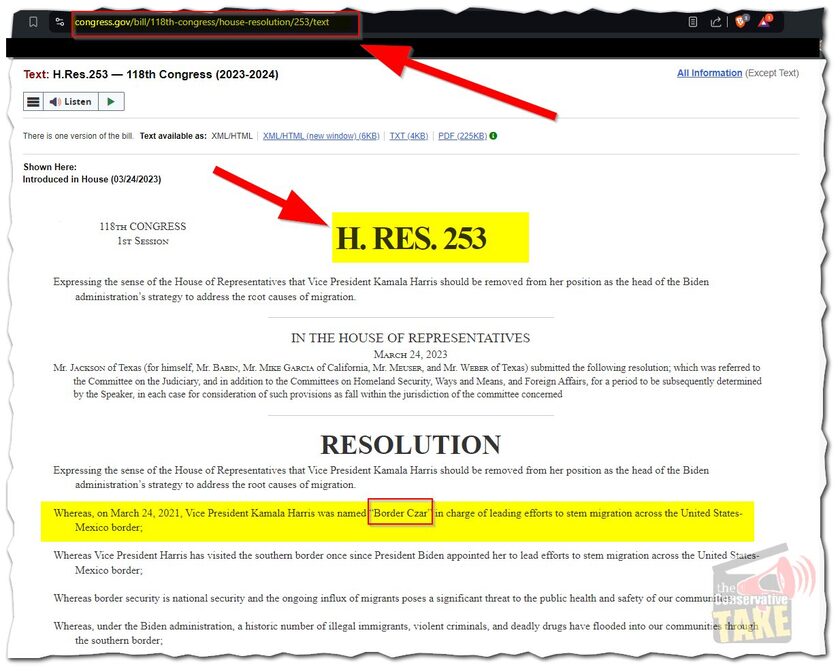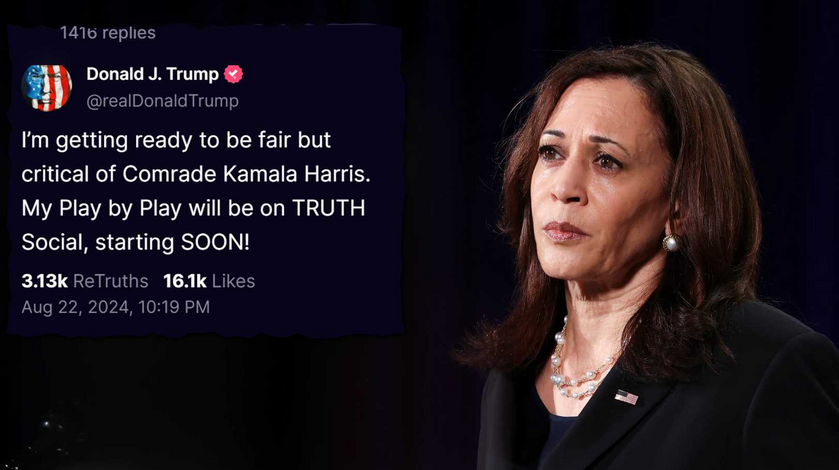Vice President Kamala Harris delivered a passionate speech at the DNC Convention last night, formally accepting the Democratic nomination for President. While her address was filled with emotional rhetoric and lofty promises, a closer examination reveals significant divergences from MAGA (Make America Great Again) policies and Donald Trump’s Agenda 47. Harris’ speech may resonate with some, but it’s essential to highlight the discrepancies, fallacies, and misleading claims she presented, particularly when scrutinized through a conservative lens. This analysis dives deep into her speech, incorporating Trump’s real-time rebuttals on Truth Social to expose the shortcomings and radical nature of Harris’ proposed policies.
A Record of Failure: Ignoring the Top Issues
Harris proudly highlighted her and President Biden's so-called accomplishments, yet she conveniently glossed over the administration’s numerous failures. After four years in office, the Biden-Harris administration has overseen rising inflation, increasing crime rates, and a southern border crisis that poses a significant national security threat. Despite these pressing issues being top voter concerns, Harris barely addressed them, opting instead for emotional storytelling devoid of substantive solutions.
The Economy: Misrepresentations and Failures
Harris’ Claim: The Biden-Harris administration has strengthened the middle class and created an "opportunity economy."
Trump’s Rebuttal: Trump countered this narrative by listing the administration's economic failures: "• Allowed 15M unvetted illegals into the country • Historic inflation crisis • Record high gas prices in all 50 states • Record high consumer debt • Released terrorists into the country • Ukraine-Russia War • Israel-Hamas War • Disastrous withdrawal from Afghanistan • Violent crime skyrocketing." He also noted that since Harris took office, "gas is up 51%; groceries up +22%."
Analysis: Harris’ claims of economic success are fundamentally flawed. Under her watch, American families have been burdened with the highest inflation in decades, significantly eroding their purchasing power and standard of living. The Bureau of Labor Statistics (BLS) even revised job creation numbers down by 800,000, revealing the administration’s tendency to overstate its achievements. The MAGA movement, in contrast, emphasizes policies that genuinely boost the economy—such as tax cuts and deregulation—benefiting working-class Americans by stimulating job growth and raising wages.
Marxist Underpinnings: The Threat to Free Markets
Throughout her speech, Harris proposed policies that align disturbingly with Marxist ideologies. She advocates for heavy government intervention in the economy, including increased regulation, higher taxes on businesses, and wealth redistribution—all hallmarks of Marxist economic theory. These policies, under the guise of fairness and equity, threaten to stifle innovation, discourage entrepreneurship, and ultimately hurt the very people they claim to help. The MAGA movement, by contrast, champions free-market principles that have historically proven to lift millions out of poverty and foster prosperity.
The Economy: Empty Promises
Harris’ Claim: Harris positioned herself as a champion of the middle class, promising tax cuts and policies to lower the cost of living.
Trump’s Rebuttal: Trump highlighted the reality of the situation, stating that "Houses were More Affordable under TRUMP!" and questioned why Harris hadn’t acted on these issues during her tenure. He also emphasized the inflationary pressures caused by reckless government spending under the Biden-Harris administration, which have disproportionately harmed middle-class Americans.
Analysis: The so-called "middle-class tax cut" Harris proposes is dwarfed by the inflationary pressures that have skyrocketed under her administration. While she claims to champion the middle class, the economic reality tells a different story. Trump’s Agenda 47 focuses on real economic growth, ensuring that the middle class benefits from job creation, lower taxes, and energy independence—key factors in sustaining long-term economic health.


Border Security: Rhetoric vs. Reality
Kamala Harris attempted to present her administration’s border policies as effective and robust. However, this portrayal is starkly contradicted by the reality of the ongoing border crisis. Appointed as the "border czar" by President Biden, Harris was tasked with addressing the root causes of migration. Yet, her tenure has been marked by a record influx of illegal immigrants, a situation so dire that the House of Representatives introduced H.Res.253, expressing the sense that Harris should be removed from her position due to her failure in this critical role.
Trump’s Rebuttal: Trump highlighted the stark differences between his administration’s approach and the Biden-Harris administration's failures. Under Trump, illegal border crossings significantly decreased, and immigration enforcement was prioritized, leading to what he described as "the Safest Border in Recorded History." In contrast, the Biden-Harris administration’s lenient policies have led to a surge in illegal immigration, with many criminals crossing the border, exacerbating crime rates across the nation.
Analysis: Harris’ portrayal of her border policies as strong and effective is undermined by the facts. The ongoing crisis at the southern border has not only overwhelmed law enforcement but also contributed to rising crime in American communities. Her failure to adequately address these issues in her speech reveals a concerning disconnect from the challenges faced by everyday Americans. The MAGA agenda, in contrast, emphasizes law and order, with a focus on supporting law enforcement, securing the border, and restoring safety in American communities. Trump’s critique underscores the stark differences between his results-driven approach and Harris’ ineffective leadership on one of the most pressing issues facing the nation today.




Crime: Ignoring a National Crisis
Harris largely sidestepped one of the most pressing issues facing Americans today: the rise in violent crime. Despite her attempt to position herself as a champion of public safety, the reality under the Biden-Harris administration tells a different story. Across the country, cities have experienced a surge in violent crime, with homicides, assaults, and thefts reaching alarming levels. This spike in crime is a direct result of policies that have undermined law enforcement, supported lenient prosecution, and neglected the needs of communities that are most vulnerable to violence.
Trump’s Rebuttal: Trump took Harris to task for her failures in addressing crime, pointing out that she has been complicit in the rise of lawlessness across the nation. He noted that under Harris’ watch, "violent crime skyrocketing" has become the norm, a consequence of the administration’s soft-on-crime approach. Trump also highlighted Harris’ troubling past, reminding voters that she "PAID AND RAISED BAIL TO GET THE VIOLENT RIOTERS IN MINNESOTA OUT OF JAIL" during the unrest following the George Floyd incident. This action, according to Trump, emboldened criminals and signaled a dangerous tolerance for violence and disorder.
Analysis: Harris’ failure to address the crime wave in her speech is telling. While she may speak of law and order, her track record as Vice President—and even as California’s Attorney General—reveals a pattern of policies that have weakened law enforcement and emboldened criminals. The MAGA agenda, in contrast, emphasizes strong support for police, tougher penalties for violent offenders, and a commitment to restoring safety in America’s cities. Trump’s focus on crime reduction and law enforcement contrasts sharply with Harris’ neglect of this critical issue, raising serious questions about her ability to protect American citizens.
Project 2025: Fearmongering and Misinformation
Harris’ Claim: Harris spent a significant portion of her speech attacking Donald Trump and the conservative Project 2025, which she claimed would drag America backward and dismantle civil rights protections.
Trump’s Rebuttal: Trump quickly refuted these claims, stating, "LYING AGAIN ABOUT PROJECT 2025, WHICH SHE KNOWS, AND SO DO ALL DEMOCRATS, THAT I HAVE ABSOLUTELY NOTHING TO DO WITH!" He cited a USA Today fact check clarifying that Project 2025 is a political playbook created by conservative groups like the Heritage Foundation, not by Trump. While some former Trump officials are involved, Trump himself disagrees with certain elements of the plan.
Analysis: Harris’ attempt to tie Trump directly to Project 2025 is misleading and disingenuous. The project, while conservative in nature, is not authored by Trump and does not reflect his personal agenda. This mischaracterization serves to stoke fear rather than engage in a substantive debate about policy, distracting from the pressing issues that Harris should be addressing—issues she largely ignored during her speech.


Reproductive Rights: More Scare Tactics
Harris’ Claim: Harris criticized Trump for his role in the Supreme Court’s decision to overturn Roe v. Wade, framing it as an attack on women’s rights. She accused Trump of wanting to limit access to birth control and IVF.
Trump’s Rebuttal: Trump dismissed these claims as fabrications, stating, "I do not limit access to birth control or I.V.F. - THAT IS A LIE, these are all false stories that she’s making up." He emphasized that he, like Ronald Reagan, believes in exceptions and trusts women to make decisions. Trump also pointed out that Harris’ failure on border security is what truly threatens women’s safety, as the open border "is destroying the lives of women, and the families and jobs of African Americans and Hispanics."
Analysis: Harris’ narrative on reproductive rights is overly simplistic and ignores the complexity of the abortion debate. Many Americans, including women, support greater restrictions on abortion and believe in the importance of protecting the unborn. The MAGA movement’s approach, which emphasizes federalism and the right of states to legislate on this issue, reflects a more nuanced understanding of this deeply moral debate.

National Security and Foreign Policy: A Glaring Omission of Critical Issues
Harris’ Claim: Harris portrayed herself as a capable leader in foreign policy, citing her experience in dealing with international crises and negotiations.
Trump’s Rebuttal: Trump sharply criticized Harris for failing to address the most pressing global issues: "She didn’t mention China, she didn’t mention fracking, she didn’t mention Energy, she didn’t mention, meaningfully, Russia and Ukraine." He pointed out the significant challenges facing America today, including rising tensions with China, the energy crisis, and ongoing conflicts that Harris largely ignored.
Analysis: Harris’ foreign policy approach, as presented in her speech, lacks depth and fails to address the most pressing global issues facing the United States. By not mentioning China, fracking, or energy independence, Harris leaves voters wondering how she plans to navigate these critical areas. Trump’s critique highlights the importance of a clear, decisive foreign policy that prioritizes American interests—something he believes Harris is not equipped to deliver.


Social Issues: Radical Proposals
Harris’ Claim: Harris promised to protect Social Security, Medicare, and public education while accusing Trump of wanting to eliminate these programs.
Trump’s Rebuttal: Trump turned this accusation on its head, warning that Harris’ policies would actually harm these programs. He stated, "She will obliterate Social Security and Medicare by giving it away to the Millions of Illegal Immigrants who are infiltrating our Country!" Trump also highlighted the administration’s failures in education, noting "Record low test scores for K-12 students."
Analysis: Harris’ rhetoric on Social Security, Medicare, and education is designed to play on voters' fears, but her policies, which prioritize benefits for illegal immigrants, could indeed strain these programs to the breaking point. Additionally, the Biden-Harris administration's record on education is dismal, with students across the country experiencing unprecedented declines in academic performance. This points to a broader issue of inaction and ineffective leadership on social issues that matter most to voters.

Energy Policies and Inflation: Empty Promises and Economic Pain
Harris’ Claim: Harris claimed that her administration is working to lower costs for everyday Americans and transition to a clean energy future.
Trump’s Rebuttal: Trump responded by pointing out that the Biden-Harris administration has "Declared war on American energy," which has contributed to "Record high gas prices in all 50 states" and "Historic inflation." He questioned why Harris didn’t take action on housing costs during her tenure and emphasized that housing was more affordable under his administration.
Analysis: The Biden-Harris administration’s energy policies have led to higher fuel costs and contributed to the broader inflation crisis. By undermining American energy independence, Harris and Biden have driven up costs across the board, hurting working-class families the most. Trump’s focus on energy independence contrasts sharply with their agenda, highlighting the importance of affordable energy in maintaining economic stability—an issue that Harris largely ignored in her speech.

Conclusion: A Punchless Nomination Acceptance
Kamala Harris’ speech, delivered as she accepted the Democratic nomination for President, was long on emotion but short on substance. She barely addressed the top concerns of voters—the economy, southern border security, and crime—and when she did, her proposals were either Marxist in nature or issues she could have addressed during her past four years in office but failed to do so.
Donald Trump’s real-time rebuttals on Truth Social during the speech exposed the gaps in her narrative and highlighted the stark contrast between her vision and the MAGA agenda. Harris’ speech, intended to rally her base, ultimately fell flat in addressing the real concerns of the American people. As voters consider their options in the upcoming election, the choice becomes clear: continue with the failed policies of the current administration or embrace the America First agenda that prioritizes economic growth, national security, and the well-being of all Americans. Harris’ rhetoric may have stirred emotions, but it’s Trump’s fact-based critiques that lay bare the reality of the past four years and the dire consequences of continuing down the same path.













